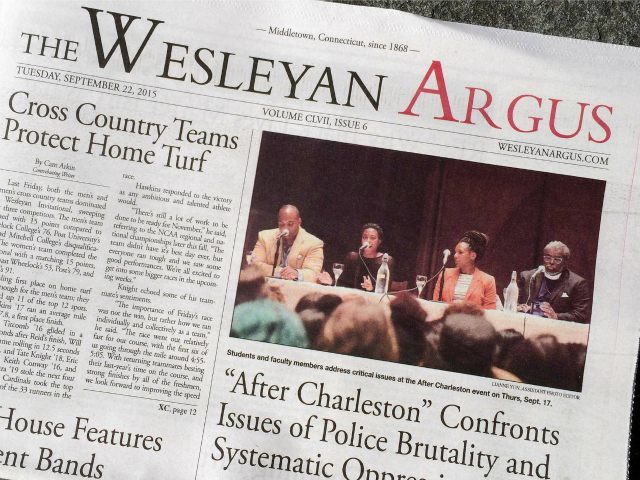Wesleyan University students destroyed the print edition of their student newspaper last month after it published an op-ed critical of Black Lives Matter. Now the student government is picking up where the protesters left off. Sunday, the student assembly voted for a resolution that would slash the funding used to publish the paper’s twice-weekly print edition.
The plan would cut the Argus‘s publication budget in half, with the $15,000 “savings” used to pay small stipends to 20 student writers at up to four online publications. The so-called “digitalization” of the Argus was framed primarily as an environmentally conscious decision to reduce paper waste and expand support for more diverse publications.
Bryan Stascavage, the student who wrote the op-ed on Black Lives Matter which generated campus protests, is a member of the Wesleyan student assembly and was present for the vote. He told Breitbart News Monday, “If the student government really believes in these work study positions, then they should be funding it from the general budget, not taking money away from the Argus.” He added, “By taking it from the Argus, it looks like a spiteful, retributive move.”
The resolution to slash the Argus’s budget, fund stipends, and give students course credit comes just weeks after protesters explicitly threatened to cut the paper’s budget if their demands, including stipends and course credit for writers, were not met. In other words, while never saying so, the new plan appears to give protesters much of what they demanded, including the elimination of most future print editions.
Rebecca Brill, the editor of the Argus, told Jezebel, “I reminded everyone in the WSA senate meeting today, we need to remember that an op-ed that made people upset is the root of this entire conversation.” She added, “But all the op-ed stuff is being divorced at this point, and is being framed as an amalgam of measures toward racial diversity, socioeconomic diversity, saving money, and environmentalism.”
The op-ed which generated the protests was moderately critical of the Black Lives Matter movement but offered a quote from a supporter of the movement as well as from a police officer who was concerned about its message. After its publication, students destroyed part of the print run, and Bryan Stascavage, the author, was called a racist both online and on campus.
Protesters started a petition, listing their demands and threatening to cut the paper’s funding. Over 150 students signed the petition. The university president did not side with the protesters and, in fact, issued a strong statement in defense of free speech, saying, “there is no right not to be offended.”
Paul Singley, president of the Connecticut Society for Professional Journalists, told the Argus last month, “You shouldn’t be second guessing whether you should publish something that you certainly have the right to just because you’re going to lose funding. That’s an unhealthy situation.”

COMMENTS
Please let us know if you're having issues with commenting.